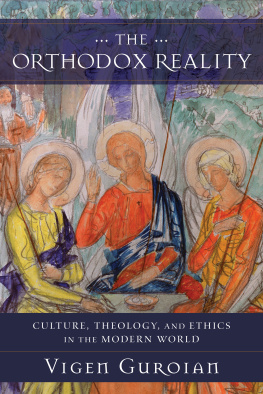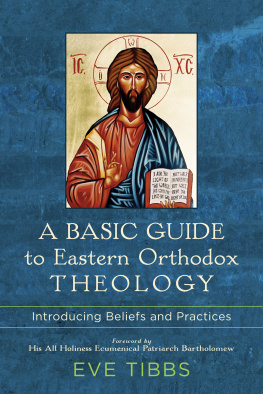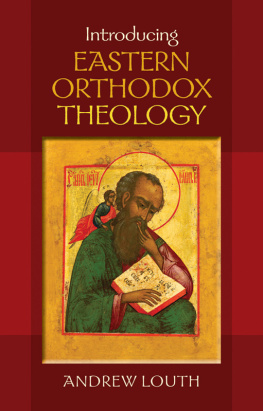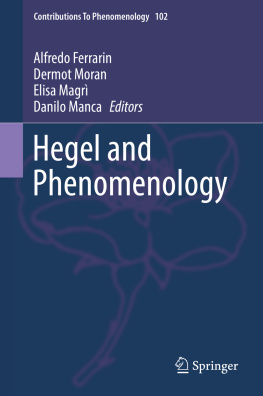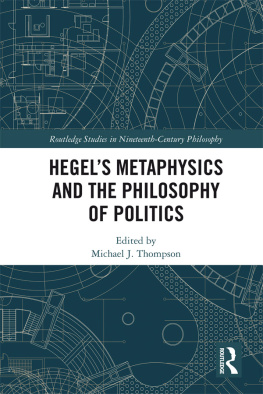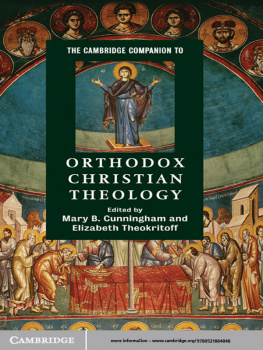Copyright 2019 Wipf and Stock. All rights reserved. Except for brief quotations in critical publications or reviews, no part of this book may be reproduced in any manner without prior written permission from the publisher. Write: Permissions, Wipf and Stock Publishers, W. th Ave., Suite , Eugene, OR 97401 .
W. th Ave., Suite
Names: Schneider, Christoph, editor.
Title: Theology and philosophy in Eastern Orthodoxy : essays on Orthodox Christianity and contemporary thought / edited by Christoph Schneider.
Description: Eugene, OR: Pickwick Publications, 2019 | Includes bibliographical references.
Identifiers: isbn 978-1-60899-421-2 ( paperback ) | isbn 978-1-4982-4309-4 ( hardcover ) | isbn 978-1-4982-4308-7 ( ebook )
Subjects: LCSH: Orthodox Eastern ChurchDoctrines | Philosophy, Modern | Philosophy, Ancient | Philosophical theology | Philosophy and religion.
Manufactured in the U.S.A. November 11, 2019
Contributors
Christina M. Gschwandtner, Professor of Philosophy at Fordham University, New York.
David Bentley Hart has taught at the University of Virginia, the University of St. Thomas (Minnesota), Duke Divinity School, Loyola University in Baltimore, has been a visiting chair at Providence College and Saint Louis University, and has of late been a Templeton Fellow and Directors Fellow at the University of Notre Dame Institute for Advanced Study.
Sergey S. Horujy , Head Researcher, Institute of Philosophy of the Russian Academy of Science; Director, Institute of Synergic Anthropology, Moscow.
Pawe Rojek, Assistant Professor at the Jagiellonian University in Krakow, Poland.
Christoph Schneider , Academic Director at the Institute for Orthodox Christian Studies, Cambridge, UK.
Kristina Stoeckl, Professor of Sociology and Principal Investigator of the project Postsecular Conflicts at the University of Innsbruck, Austria.
Dmitry Uzlaner , Director of the Center for the Study of Religion at the Russian Presidential Academy of National Economy and Public Administration (RANEPA) and Research Fellow at the University of Innsbruck, Austria and Moscow School of Social and Economic Sciences (MSSES).
Rico Vitz, Professor and Chair, Department of Philosophy, Azusa Pacific University, Los Angeles, California.
Evert van der Zweerde , Professor of Social and Political Philosophy at Radboud University, Nijmegen, Netherlands.
Introduction
The Quest for a Christian Philosophy
Christoph Schneider
O rthodoxy and Orthodox theology have long become global projects, and are no longer confined to traditionally Orthodox countries. Furthermore, the number of non-Orthodox scholars who possess in-depth knowledge about Orthodox theology and Orthodox thought is increasing. The authors who have contributed to this volume live and work in Austria, the Netherlands, Poland, Russia, the UK, and the US. The aim of this collection of essays is to reflect on the relationship between Orthodox theology and contemporary philosophy. The contributors were invited to write specialized, but at the same time accessible, essays on key philosophical topics.
The first two contributions are dedicated to Orthodox theology and political philosophy. Evert van der Zweerde discusses the relationship between theocracy, sobornost , and democracy in the works of Vladimir Solovyov, Nikolai Berdyaev, and Ivan Ilyin. According to these thinkers, there is no strict opposition between either theocracy and democracy, or between democracy and sobornost . In order to understand their main ideas, one has to pay attention to the more fundamental difference between a theocractic and an anthropocratic understanding of politics. It is the anthropocratic approach that all three thinkers rejectalthough they hold different views about how to realize the theocratic ideal.
Kristina Stoeckl and Dmitry Uzlaner reflect on the notion of the post-secular in contemporary Russia, focusing on the descriptive as well as normative meaning of this concept. They raise the question of whether it is possible to discern a third way in Russian society that avoids both a reactionary return to pre-Soviet conditions and an uncritical embrace of modern secularism. Yet they come to the conclusion that a profound and creative reconfiguration of the religious-secular divide that goes beyond these two extreme positions is missing in contemporary Russia.
Christina Gschwandtner takes a little-known text on Eastern Orthodoxy by Max Scheler as the starting point of her reflections on Orthodox theology and phenomenology. Drawing on ascetic texts by Evagrius of Pontus and Symeon the New Theologian, as well as on the anonymous writing The Way of Pilgrim , she provides a phenomenological analysis of Orthodox consciousness, discernment, and spiritual experience. She argues that Schelers view of the Orthodox ethos as a passive, otherworldly, and apolitical quietism that pays little attention to neighborly love and social responsibility, is insufficiently nuanced and disregards important aspects of Orthodox spiritual life.
David Bentley Hart argues for the inevitability of metaphysics in Orthodox theology. For him, the concept of a wholly post-metaphysical theology amounts to a contradiction in terms. Hart appreciates Jean-Luc Marions subtle phenomenological analyses, but gives an account of a religious epistemology and ontology that is more consistently based on the christological and trinitarian doctrines as well as on a non-dualistic understanding of the relationship of nature and grace. Hart refuses to view the apocalyptic novelty of the event of revelation and the metaphysical conjectures of human reason in anticipation and response to this event as mutually exclusive.
Sergey Horujy presents a summary of his Synergic Anthropology , an original and complex Orthodox philosophy of the self that combines Zizioulass personalism with the Palamite doctrine of the divine energies, and aspects of secular, postmodern conceptions of the self. His aim is to establish a constructive dialogue between religious and secular thought, and to widen the horizon of Orthodox discourse on the self that is often too narrowly defined in ecclesial and eucharistic terms.
Pawe Rojek reflects on the claim that Christian truth is antinomica view which either leads to a radical theological irrationalism, or a non-classical logic. More specifically, he explores whether Pavel Forenskys deabsolutization of the law of identity and non-contradiction is best interpreted in terms of a paraconsistent, L-consistent, or non-monotonic logic, or whether a rhetorical understanding of his discourse about antinomy is more plausible. Rojek argues that this question cannot be conclusively answered, and that all four options express aspects of Florenkys views.
Rico Vitz begins his considerations on Orthodoxy and ethics with a brief account of the three dominant approaches in philosophical ethics: virtue ethics, deontology, and utilitarianism. He sees a particular affinity between Orthodoxy and virtue ethics and explains how the church fathers adopted and modified the pre-Christian understanding of virtue, and how it helped them to conceive of the way to deification in Christ. Moreover, he points to some interesting parallels between Orthodox virtue ethics and Confucianism. Vitz also articulates a response to the situationist challenge that questions the plausibility of virtue ethics to explain human behavior.


